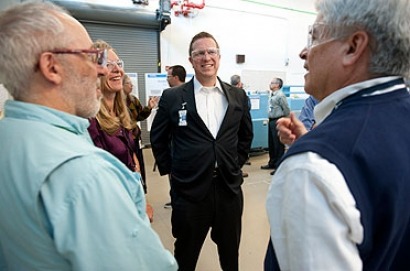
The SunShot Grand Challenge Summit in Denver, Colorado (US), this week brought together the best and brightest minds in the solar industry to assess progress and plot the path forward to bring solar into cost-competition with other energy resources without subsidy. As part of the Energy Department's SunShot Initiative, Energy Secretary Steven Chu announced aggressive steps to further drive down the cost of clean, affordable solar energy, while supporting US manufacturing leadership in innovative solar energy technologies.
This week also saw the Energy Department announcing new projects to reduce installation, permitting, and other "soft costs," to build highly innovative solar manufacturing facilities, and to foster breakthroughs in concentrating solar power technologies. The awards include up to $8 million this year to support nine highly innovative start-ups through the SunShot Incubator program. These companies are developing transformative solutions to streamline solar installation processes such as financing, permitting, and inspection. This investment builds on the Incubator program's proven track record of attracting follow-on investment for solar start-ups at a ratio of $30 in private investment for every $1 of government funding.
In addition, the Energy Department announced a $37 million investment this year to build three solar manufacturing facilities in California and Massachusetts, and expand an existing plant in Pennsylvania. These plants will produce the world's most efficient solar cells on a large scale, make new, larger modules to reduce installation costs, and will ramp up a revolutionary process for making silicon wafers—the basic building blocks of solar panels. These projects seek to boost America's manufacturing competitiveness in the global solar market. At capacity, the manufacturing plants are expected to support approximately 600 direct jobs and thousands more throughout the solar manufacturing supply chain. A new funding opportunity related to the next generation of the SUNPATH Innovative Manufacturing Initiative is planned for later this year.
To spur the use of low-cost residential and small commercial rooftop solar systems across the nation, the Department is launching the first SunShot competition to challenge US teams to quickly drive down the cost of installed rooftop photovoltaic (PV) systems. America's Most Affordable Rooftop Solar competition offers a total of $10 million in prize money to the first three US teams that can install 5,000 rooftop solar PV systems at an average price of $2 per watt. By setting an ambitious target, the competition aims to spur creative public-private partnerships, original business models, and innovative approaches to make solar energy affordable for millions of families and businesses.
Finally, the Department announced a new funding opportunity, inviting researchers and industry experts to propose data-driven pilot experiments that can improve the current understanding of how new technologies are developed and adopted, helping to speed the deployment of solar energy. For example, these projects may conduct research on technology diffusion patterns or examine how to structure attractive financing options for US consumers. Through the Solar Energy Evolution and Diffusion Studies (SEEDS) program, approximately $4.5 million is expected to be available this year for up to ten projects.
The SunShot Initiative is a collaborative national effort to make solar energy cost competitive with other forms of energy by the end of the decade without subsidy. Inspired by President Kennedy's "Moon Shot" program that put the first man on the moon, the SunShot Initiative has created new momentum for the solar industry by highlighting the need for American competitiveness in the clean energy race.
For additional information:

